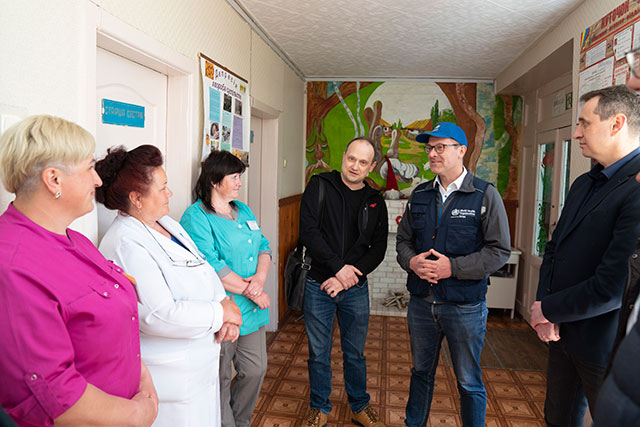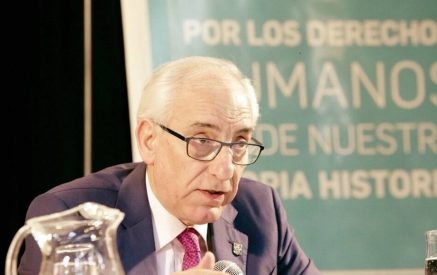Statement by Dr Hans Henri P. Kluge, WHO Regional Director for Europe
Good evening, Ukraine.
I’d like to begin by expressing my immense appreciation and admiration for the health workers of this country, who have shown tremendous bravery and dedication since the war began. You have done the impossible: you stand firm and save lives.
As of today, WHO has verified 226 attacks on health care in Ukraine. That is almost 3 attacks per day since 24 February. They have left at least 75 people dead and 59 injured. Two thirds of all attacks on health care this year verified by WHO globally have been in Ukraine.
Read also
These attacks are not justifiable, they are never OK, and they must be investigated. It is an insult to the dedication and integrity of health workers everywhere that they continue with impunity. No health professional should have to deliver health care on a knife edge.
But this is just what nurses, doctors, ambulance drivers – the medical teams of Ukraine – are doing. You keep health services and hope alive in the face of unbelievable sorrow and suffering. I salute your courage and want you to know that WHO stands with you.
This is my third visit to Ukraine this year, and the second since late February. I am here for 3 main reasons.
Firstly, I have been fortunate enough to meet some of the country’s health heroes, to hear their stories and the challenges they face in delivering health care, and to understand how WHO can continue to support them.
Yesterday I spent the day in Chernihiv oblast with Minister of Health Viktor Liashko, where I visited several hospitals and health facilities and spoke to professionals and patients. It was both heartbreaking and inspiring. Heartbreaking because of the immense destruction to the health system and the devastating impact on people’s lives. Inspiring because of the stories of resilience and perseverance.
I heard of ordinary citizens coming to the rescue of patients in hospitals under fire; of doctors and nurses coming out of retirement to volunteer their services for free; of boats being used to get medicines to people when roads were inaccessible; and many individual stories of bravery and sacrifice.
Secondly, I am here this week to meet national authorities and partners to get first-hand insights on what further action is needed now.
Many health challenges lie before us:
1 in 3 people with a chronic condition struggle to access medicines
1 in 3 tuberculosis cases are multidrug resistant
vaccine coverage for polio and measles remains below the recommended rate of 95%.
With our dedicated teams, WHO is working with national authorities and partners, responding to the immediate and long-term health needs of the Ukrainian people – those who have returned after being forced to flee, those who stayed and those who are displaced within the country’s borders.
From what I saw yesterday while visiting Chernihiv, mental health services need to be further scaled up to reach communities. According to WHO, 1 in 5 people in conflict areas are likely to develop serious mental health problems. Over 16 000 people in Ukraine with moderate to severe mental health conditions face shortages of essential medicines. I am happy to see that the Government of Ukraine, with the strong support of the First Lady, are putting mental health on the agenda.
According to the United Nations, sexual violence is a serious threat to mostly women and girls in conflict areas. I am deeply troubled by reports of an increase in sexual violence and exploitation in Ukraine, which ruins lives and is inadmissible. WHO is committed to meeting the health needs of survivors while doing everything we can to prevent sexual exploitation and abuse in the first place, together with the Government and nongovernmental organizations, with which I just met.
We are also concerned about the potential of a cholera outbreak in occupied areas, where water and sanitation infrastructure is damaged or destroyed. That’s why we are already pre-positioning cholera vaccines in our hub in Dnipro.
Today, on day 83 of this war, we are starting to understand more about how the health system in Ukraine has been affected, and perhaps more importantly, what the long-term needs will be, as we begin the long and challenging road to recovery.
My third reason for being here is to put health at the heart of Ukraine’s recovery and reconstruction efforts. Prime Minister Shmyhal and I agree – health is not everything, but without health there is nothing.
Even as we try to meet Ukraine’s urgent health needs today, we are also looking ahead to the future, and how we can help Ukraine’s health system build back smarter, stronger and greener.
For example, power supply has been a consistent problem for many hospitals and health facilities that find themselves in active conflict areas. WHO has been working very hard to deliver generators to fill this gap. But looking more long-term, we are working with the Ministry of Health to move towards renewable energies to power Ukraine’s health system, ensuring reliability and sustainability for the future.
And as your health workers represent hope in their local neighbourhoods today, so the future health system must deliver people-centred services closer to the communities it serves – responsive and agile services, such as mobile mental health, primary care and digital services.
Peace is a precondition for health. All our efforts to rebuild and reform could fail without peace. I would like to reiterate the call by the United Nations Secretary-General “for an immediate ceasefire and for an end to Russia’s war in Ukraine”.
These days, I have borne witness to the incredible positivity, ingenuity and resilience of you, the Ukrainian people. WHO is with you today, tomorrow, and for a brighter, healthier future.
Thank you.

























































